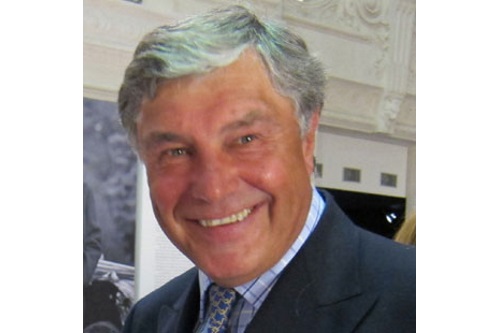NOTICE OF DEATH - ADRIAN HAMILTON (1948-2021)

We regret to inform Members of the death last Saturday of Adrian Hamilton from the effects of a severe stroke which he had suffered a week earlier. Adrian, who was 73 years old, was elected as an Associate Member of the BRDC in 1993.
Adrian’s formative years were very much spent in a motor racing environment given that his father J Duncan Hamilton was one of the most prominent and colourful British drivers of the decade immediately following World War 2. After leaving school, Adrian spent two years in the Merchant Navy before his father accepted him into his business Duncan Hamilton Ltd, based initially at Byfleet which would have been within earshot of the old Brooklands track had there been anything to hear. Given Duncan’s racing success with Jaguars in the 1950s, including victory at Le Mans with a C-type in 1953 and second place with the first D-type the following year, on both occasions with his great friend Tony Rolt as team-mate, the company’s focus was principally on Jaguar.
Duncan retired from racing at the end of the 1958 season but Adrian never really took up racing as a driver himself. Duncan had acquired the Ford GT40 (1045) which Girling had used as a brake development vehicle and Adrian competed with this in a handful of club races and other events such as the Brighton Speed Trials. Also, on one memorable occasion in the early ‘70s, Adrian turned up at Thruxton for a production saloon car race with his father’s vast Mercedes-Benz 600 which performed decently enough until the brakes gave up the unequal struggle.
In 1969 and 1970 Duncan Hamilton & Company entered the British Saloon Car Championship with a Ford Escort Twin Cam principally driven by the late John Hine with, in John’s words, ‘a modicum of success’. Highlight of the first season was third place overall and a 2-litre class win for John in the BSCC race supporting the 1969 British Grand Prix at Silverstone. The second season started promisingly with third overall and second in class, to Chris Craft’s Broadspeed Escort, in the opening BSCC round at Brands Hatch supporting the Formula 1 Race of Champions whilst at the Silverstone Martini Trophy meeting John again finished third overall and first in class ahead of Chris.
Not surprisingly given his father’s Le Mans successes, Adrian developed an affinity with the great 24 hour race. On eight occasions he was involved with the management of various cars in the race beginning with Paul Vestey’s Ferrari 275LM in 1968 with Roy Pike as co-driver. In 1969 Peter Sadler’s Ford GT40 was shared with Paul and in 1970 the works-run Chevron B16 driven by its owner Ian ‘Mo’ Skailes and John Hine looked to be on course to win its class until the Cosworth FVC engine failed terminally some 90 minutes from the finish. The following year Adrian teamed up with his lifelong friend Stuart Rolt, Tony’s son, to manage Paul Vestey’s Porsche 911S, one of no less than 23 entered for the 1971 race. With driving duties shared between the car’s owner and Richard Bond, at an early stage the car was leading its class only for ‘Bondini’ to fall foul of Maison Blanche around midnight which necessitated extensive repairs. After the replacement of a couple of wheel hubs, a driveshaft and various suspension components, the car reached the finish in 12th place, the last of the 49 starters to be classified in a race of serious attrition. Of the 12 finishers, six were Porsche 911Ss.
In 1975 Adrian managed the Rays Racing Lola T292 driven by Nigel Clarkson and Derek Worthington for which two of the pit personnel were Patrick Head and Nigel’s friend Prince Michael of Kent. A member of the Royal family also featured in Adrian’s final Le Mans as a team manager when Alain de Cadenet and Chris Craft, two of the drivers for Paul Vestey’s Porsche 956, missed the first practice session after being asked to show Her Majesty the Queen Mother round a display of historic Le Mans cars. Together with third driver, the Australian touring car star Allan Grice, Alain and Chris were running in 11th place when engine failure ended their run in the 22nd hour.
Duncan Hamilton retired from full-time involvement in his business in 1971 by which time Adrian, with a keen interest in motor racing history, had started dealing in historic and classic cars long before this became the industry that it is in the 21st century. As Managing Director of Duncan Hamilton & Company Adrian established a reputation for dealing in the very best of collectible classics and knowing where to find them. He did not always seize an opportunity, however. As recounted in the second edition of Duncan Hamilton’s autobiography Touch Wood!, Adrian declined an offer from the celebrated Australian driver Paul Hawkins to sell him the ex-works Jaguar D-type OKV3 for £3000 on the grounds that he knew Hawkeye had only paid £1500 for the car and Adrian considered a 100% profit to be excessive.
In the last few years Adrian played a major role in putting together in conjunction with Roald Goethe the highly impressive ROFGO collection of over 30 competition cars with Gulf Oil associations.
Although Adrian never drove in the Le Mans 24 Hours himself, he was very proud when his son Archie, a BRDC Ful Member, was able to do so in 2013 and 2014, the first occasion of course being the 60th anniversary of Duncan’s victory with Tony Rolt in the Jaguar C-type.
Adrian was married twice and was father of two daughters Emily and Katolina and four sons Dominic, Archie, Eddie and Henry to whom, and to his sister Caroline, the BRDC extends its most sincere condolences. A private family funeral service took place earlier today.





